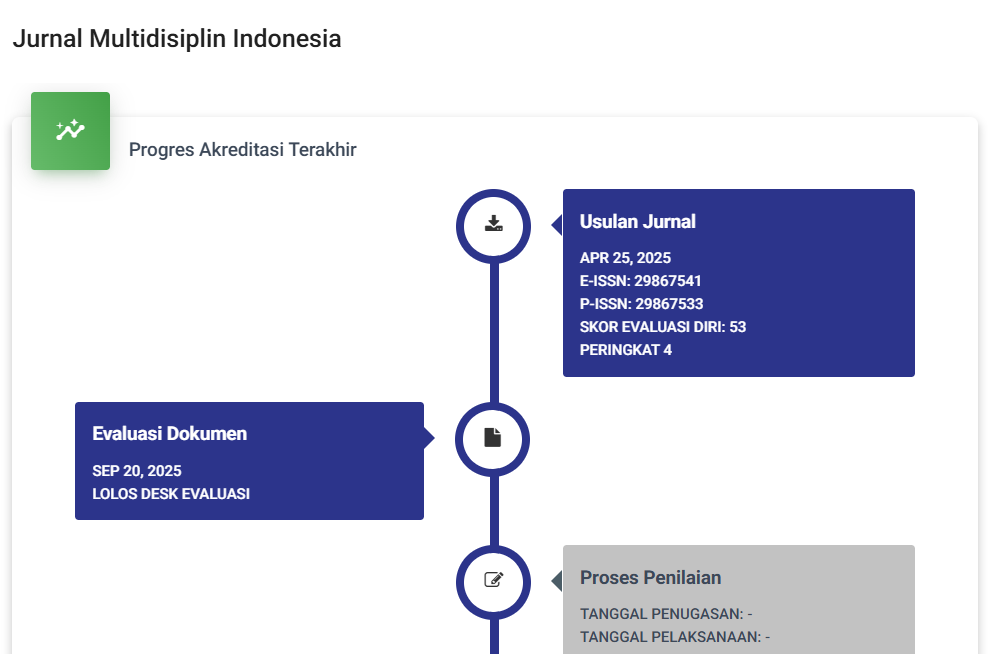Economic Analysis In The Formation of Legislation in Indonesia
DOI:
https://doi.org/10.62007/joumi.v3i2.510Keywords:
Legislation, Economic Growth, Legal Certainty, Sustainable DevelopmentAbstract
The formulation of legislation in Indonesia holds a pivotal role in establishing a legal framework that ensures inclusive and sustainable economic growth. With a population exceeding 282 million, Indonesia is confronted with multifaceted challenges in formulating policies that equitably balance economic, social, and environmental interests. This article critically examines the legislative process in Indonesia from an economic perspective, emphasizing its implications for the investment climate, economic growth, and sustainable development. The study references various case studies, including the enactment of the Job Creation Law (2020), which seeks to enhance investment competitiveness through bureaucratic streamlining but has elicited criticism regarding labor protection and environmental sustainability. This article underscores that the quality of regulatory frameworks and the assurance of legal certainty constitute fundamental determinants of economic stability and competitiveness. The analysis demonstrates that, while Indonesia has recorded an average annual economic growth rate of approximately 5%, persistent regulatory uncertainty and abrupt policy changes represent significant impediments to foreign direct investment (FDI) and the advancement of specific economic sectors. Moreover, the divergence of interests among governmental authorities, the private sector, and civil society in the legislative process creates additional obstacles to the adoption of equitable and inclusive policies. The article advocates for the integration of comprehensive economic analysis into the legislative drafting process to enhance transparency, consistency, and efficacy in regulatory outcomes. Such an approach is anticipated to mitigate adverse effects on social and environmental sectors while concurrently fostering the realization of national sustainable development objectives. Accordingly, this analysis provides valuable insights into the critical role of legislation in advancing economic stability and promoting equitable prosperity within Indonesia's legal and economic landscape.
References
Badan Pusat Statistik (BPS). (2022). Indeks Ketimpangan Pendapatan di Indonesia.
Buchanan, J. M., & Tullock, G. (1962). The Calculus of Consent: Logical Foundations of Constitutional Democracy. University of Michigan Press.
Buchanan, James, & Tullock, Gordon. (1962). The Calculus of Consent: Logical Foundations of Constitutional Democracy. University of Michigan Press.
Djankov, S., La Porta, R., Lopez-de-Silanes, F., & Shleifer, A. (2002). The Regulation of Entry. The Quarterly Journal of Economics, 117(1), 1-37. https://doi.org/10.1162/003355302753550356
Hausmann, R., Rodrik, D., & Velasco, A. (2005). Growth Diagnostics. The World Bank.
https://www.bi.go.id/id/publikasi/ruang-media/news release/Pages/sp_2620624.aspx?utm_source=chatgpt.com
International Labour Organization (ILO). (2021). Reformasi Ketenagakerjaan di Indonesia: Dampak dan Tantangan.
Kementerian Kesehatan Republik Indonesia. (2022). Laporan Akses Kesehatan di Daerah Terpencil.
Marx, K. (1867). Das Kapital: Kritik der politischen Ökonomie [Capital: A Critique of Political Economy]. Verlag von Otto Meisner.
North, D. C. (1990). Institutions, Institutional Change, and Economic Performance. Cambridge University Press.
North, Douglass C. (1990). Institutions, Institutional Change, and Economic Performance. Cambridge University Press.
Oxfam Indonesia. (2021). Laporan Ketimpangan Ekonomi: Kekayaan 1% Orang Terkaya di Indonesia.
Pigou, Arthur Cecil. (1920). The Economics of Welfare. Macmillan.
Rodrik, Dani. (2007). One Economics, Many Recipes: Globalization, Institutions, and Economic Growth. Princeton University Press.
Scholten, P. (2008). The Role of Law in Economic Development. Cambridge University Press.
Sen, Amartya. (1999). Development as Freedom. Alfred A. Knopf.
Smith, A. (1776). An Inquiry into the Nature and Causes of the Wealth of Nations. W. Strahan and T. Cadell.
Stiglitz, Joseph E. (2012). The Price of Inequality: How Today's Divided Society Endangers Our Future. W.W. Norton & Company.
Weber, M. (1922). Economy and Society: An Outline of Interpretive Sociology (Ed. G. Roth & C. Wittich, Trans.). University of California Press. (Edisi asli dalam bahasa Jerman: "Wirtschaft und Gesellschaft").
World Bank. (2021). Indonesia Economic Quarterly: Strengthening the Foundations for a Sustainable Recovery.
Downloads
Published
How to Cite
Issue
Section
License
Copyright (c) 2025 K. Johnson Rajagukguk, Faisal Santiago, Ahmad Redi

This work is licensed under a Creative Commons Attribution-ShareAlike 4.0 International License.







